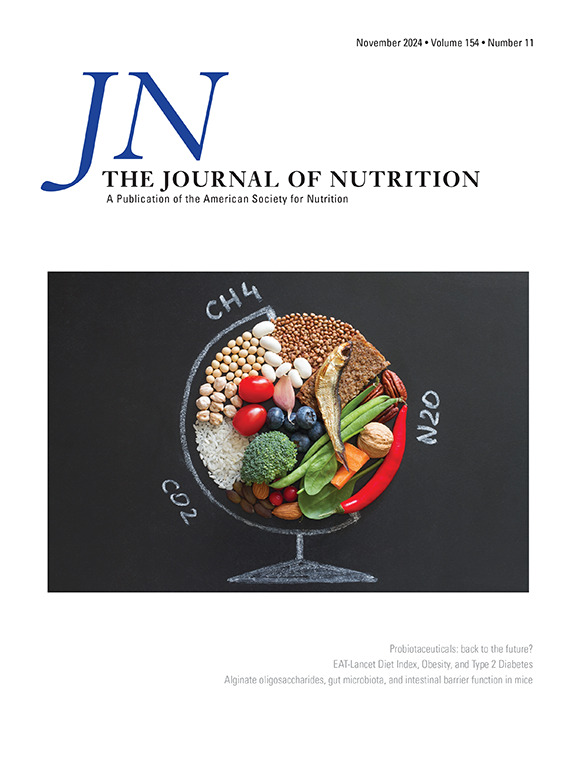全基因组关联研究发现中国孕前妇女叶酸相关生物标志物的基因多态性
IF 3.7
3区 医学
Q2 NUTRITION & DIETETICS
引用次数: 0
摘要
背景:不同种族人群的SNP等位基因频率、饮食习惯、叶酸状况及其相关性各不相同。对于导致中国备孕女性叶酸相关生物标志物变化的 SNPs,人们知之甚少:目的:我们旨在确定导致中国女性孕前人群红细胞和血清叶酸、维生素 B-12 和同型半胱氨酸水平变化的 SNPs:方法:我们对从 SPCC 随机挑选的 1000 名孕前中国女性进行了基因组学分析。使用 Illumina 芯片对 SNPs 进行基因分型,并在加性遗传模型假设下使用简单线性回归模型评估与生物标志物的关联。P<10-7为全基因组显著性:结果:MTHFR rs1801133 是导致红细胞叶酸、血清叶酸和同型半胱氨酸浓度的主要遗传编码变异(P=2.28×10-16;P=8.85×10-8 和 P=2.46×10-13)。它与红细胞叶酸增加(对数变换后,每增加一个风险等位基因,β=0.154)、血清叶酸降低(每增加一个风险等位基因,β=-0.951)和血清同型半胱氨酸浓度增加(每增加一个风险等位基因,β=1.153)有关。与血清叶酸相关的主要 SNP 是 NTRK2 中的 rs147162222(P=2.55×10-8),而与同型半胱氨酸相关的 SNP 是位于 PDE7B 和 LINC00271 之间的 rs77025184(P=4.91×10-17)。就维生素 B-12 而言,FUT2 rs1047781 是显性遗传变异(P=1.59×10-10)。RBC叶酸、血清叶酸、维生素B-12和同型半胱氨酸中P值为-7的信号数量分别为12、18、8和614个:本研究是首次在中国备孕女性人群中开展叶酸相关生物标志物的 GWAS 研究。优势 SNPs 对各生物标志物的贡献与其他人群存在部分差异。研究发现,MTHFR 中的 rs1801133 (C677T) 是影响红细胞叶酸的主要遗传变异,而 FUT2 中的 rs1047781 (A385T) 则是影响维生素 B-12 的主要遗传变异。值得注意的是,内含子 rs147162222 和非编码 rs77025184 都是首次被检测到的 SNPs,它们分别是血清叶酸和同型半胱氨酸的主要 SNPs。本文章由计算机程序翻译,如有差异,请以英文原文为准。
Genome-Wide Association Study Identifies Genetic Polymorphisms for Folate-Related Biomarkers in Chinese Preconception Women
Background
Single-nucleotide polymorphism (SNP) allele frequencies, dietary habits, and folate status and their associations vary across ethnic populations. Little is known about the SNPs accounting for variations of folate-related biomarkers for Chinese preparing-for-pregnant females.
Objectives
We aimed to identify SNPs contributing to RBC and serum folate, vitamin B-12, and homocysteine concentrations in Chinese female preconception population.
Methods
A genome-wide association study was conducted on 1000 randomly selected preconception Chinese women from the Shanghai Preconception Cohort. SNPs were genotyped using Illumina chips, and associations with biomarkers were assessed using simple linear regression models under the assumption of an additive genetic model. Genome-wide significance was considered at P < 10−7.
Results
The MTHFR rs1801133 was the major genetic coding variant contributing to RBC folate, serum folate, and homocysteine concentrations (P = 2.28 × 10−16; P = 8.85 × 10−8, and P = 2.46 × 10−13, repsectively). It is associated with increased RBC folate (β: 0.154 per additional risk allele after log transform), decreased serum folate (β: −0.951 per additional risk allele), and increased serum homocysteine concentrations (β: 1.153 per additional risk allele). The predominant SNP associated with serum folate was rs147162222 in NTRK2 (P = 2.55 × 10−8), although that associated with homocysteine was rs77025184 located between PDE7B and LINC00271 (P = 4.91 × 10−17). For vitamin B-12, FUT2 rs1047781 was the dominant genetic variant (P = 1.59 × 10−10). The numbers of signals with a P value of <10−7 for RBC folate, serum folate, vitamin B-12, and homocysteine were 12, 18, 8, and 614, respectively.
Conclusions
This study represents the first genome-wide association study focusing on folate-related biomarkers in a Chinese preparing-for-pregnant female population. The contributions of dominent SNPs to each biomarker are partly different from other populations. The rs1801133 (C677T) in MTHFR is the predominant genetic variant contributing to RBC folate and rs1047781 (A385T) in FUT2 as the primary one explaining vitamin B-12. Notably, the intronic rs147162222 and noncoding rs77025184 are the predominant SNPs for serum folate and homocysteine, respectively.
求助全文
通过发布文献求助,成功后即可免费获取论文全文。
去求助
来源期刊

Journal of Nutrition
医学-营养学
CiteScore
7.60
自引率
4.80%
发文量
260
审稿时长
39 days
期刊介绍:
The Journal of Nutrition (JN/J Nutr) publishes peer-reviewed original research papers covering all aspects of experimental nutrition in humans and other animal species; special articles such as reviews and biographies of prominent nutrition scientists; and issues, opinions, and commentaries on controversial issues in nutrition. Supplements are frequently published to provide extended discussion of topics of special interest.
 求助内容:
求助内容: 应助结果提醒方式:
应助结果提醒方式:


